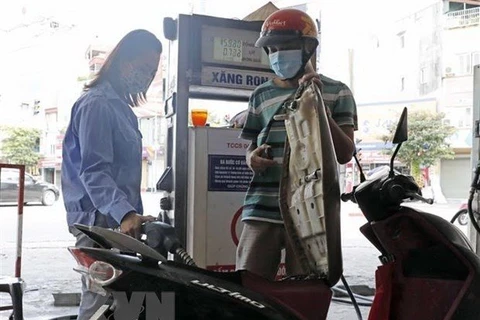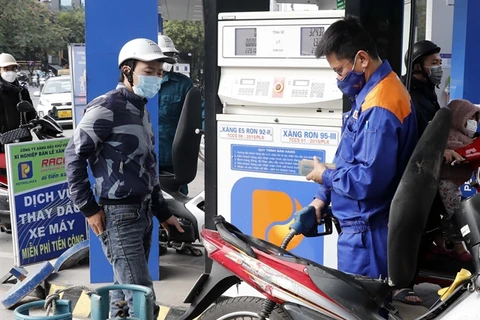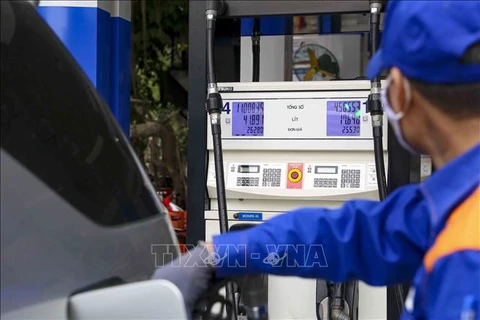Hanoi (VNA) – Cuts of the special consumption and environmental protection taxes on petroleum may be a suitable solution to the current petrol price issue, according to economists.
Vietnam’s petrol prices have increased continuously and neared 27,000 VND (1.18 USD) per litre, a record high in the past 8 years.
According to Dr. Nguyen Bich Lam, former Director of the General Statistics Office, petroleum is a strategic and important commodity, accounting for 3.52 percent of the economy’s total production costs and 1.5 percent of the total household expenditure. It is used in almost all industries and fields, and has a strong impact on production and consumer prices.
Domestically produced gasoline makes up only 70-75 percent of the total supply in the country, and the domestic production of this commodity depends much on crude oil imports. Therefore, domestic fluctuations depend much on those of the world gasoline prices.
With intensive and extensive impact on industries and fields, gasoline prices are forecast to continue rising in 2022, causing pressure of inflation and creating a new higher price level of the economy, Lam added.
Sharing the view, economist Ngo Tri Long said that the price of petrol will maintain the upward trend.
According to him, the increase in petrol prices has a great indirect impact on many fields, with transportation, logistics, offshore fishing and agriculture affected most.
As domestic gasoline prices depend on the world’s ones, the problem is how to get the domestic price close to the world price increase, Long stated, stressing that only two tools can be used: tax and the petrol price stabilisation fund.
However, there is not much room left in the fund and, as a result, only the tax tool can be used, of which the special consumption and environmental protection taxes can be reduced.
Currently, the taxes applied on petroleum products include import, value-added, excise, and environmental protection. Of this, imported gasoline is subject to 10 percent import tax, a special consumption tax on gasoline at 10 percent, an environmental protection tax for one litre of E5 petrol 3,800 VND, RON 95 petrol at 4,000 VND, and diesel at 2,000 VND.
In the long run, Nguyen Tien Thoa, Chairman of the Vietnam Valuation Association, stressed the need to have stronger reforms in petrol and oil business management to properly implement petrol trading in accordance with the market mechanism.
It is also important to remove the unreasonable and unfair protection status among enterprises in order to create a healthy competition environment, he added./.
Vietnam’s petrol prices have increased continuously and neared 27,000 VND (1.18 USD) per litre, a record high in the past 8 years.
According to Dr. Nguyen Bich Lam, former Director of the General Statistics Office, petroleum is a strategic and important commodity, accounting for 3.52 percent of the economy’s total production costs and 1.5 percent of the total household expenditure. It is used in almost all industries and fields, and has a strong impact on production and consumer prices.
Domestically produced gasoline makes up only 70-75 percent of the total supply in the country, and the domestic production of this commodity depends much on crude oil imports. Therefore, domestic fluctuations depend much on those of the world gasoline prices.
With intensive and extensive impact on industries and fields, gasoline prices are forecast to continue rising in 2022, causing pressure of inflation and creating a new higher price level of the economy, Lam added.
Sharing the view, economist Ngo Tri Long said that the price of petrol will maintain the upward trend.
According to him, the increase in petrol prices has a great indirect impact on many fields, with transportation, logistics, offshore fishing and agriculture affected most.
As domestic gasoline prices depend on the world’s ones, the problem is how to get the domestic price close to the world price increase, Long stated, stressing that only two tools can be used: tax and the petrol price stabilisation fund.
However, there is not much room left in the fund and, as a result, only the tax tool can be used, of which the special consumption and environmental protection taxes can be reduced.
Currently, the taxes applied on petroleum products include import, value-added, excise, and environmental protection. Of this, imported gasoline is subject to 10 percent import tax, a special consumption tax on gasoline at 10 percent, an environmental protection tax for one litre of E5 petrol 3,800 VND, RON 95 petrol at 4,000 VND, and diesel at 2,000 VND.
In the long run, Nguyen Tien Thoa, Chairman of the Vietnam Valuation Association, stressed the need to have stronger reforms in petrol and oil business management to properly implement petrol trading in accordance with the market mechanism.
It is also important to remove the unreasonable and unfair protection status among enterprises in order to create a healthy competition environment, he added./.
VNA

























